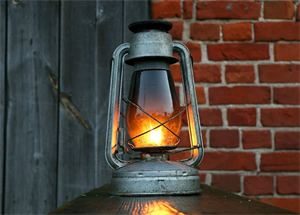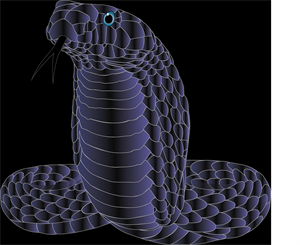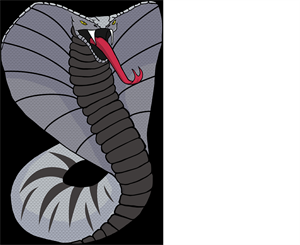PDF chapter test TRY NOW
The story, "The Snake and the Mirror," is a narrative inside a narrative written by Vaikom Muhammad Basheer. A narrative inside a narrative, also known as an embedded narrative, is a literary device in which a character within a story becomes the narrator of a second story.
The story was originally written in the Malayalam language and was translated into English by V.Abdulla. The narrator (First narrator) had presented the narrative to the readers, which was told to him and some other people by a homoeopathic doctor who is the protagonist of the story (Second narrator).

The Homeopathic Doctor
Homeopathy is a medical system that is based on the concept that the human body has the ability to heal itself. Plants and minerals are used in small amounts as medicine by those who practise it as, they think, it helps the body recover.
The story begins with the doctor's question, asking the author and members of his group whether any of them had ever been coiled by a cobra snake. The subject arose during a discussion about snakes between the narrator's group and the doctor. The word 'Cobra' made everyone in the narrator's group frightened. The doctor's query had an odd and serious appearance to it. Everyone remained quiet, expecting the doctor to continue the story.
The doctor then told them about an occurrence from his past. It was about ten o'clock on a hot summer night, and he was returning home from the restaurant. The doctor heard a noise from above as he opened the door to his room, but he didn't react because he was used to such a noise. Those noises were coming from the rats in the doctor's room. As the rats had been in the doctor's room for a long time, he was unconcerned about their noise. The doctor's room was dark, and so he lighted a kerosene lamp.

Kerosene lamp
There was no electricity in the doctor's room, and so there was no electric light. He resided in a very small rented room with no facilities due to his poor condition. He earned a meagre income from his medical practice in the initial days. His poor state forced him to live in a small, filthy room infested with rats.
He didn't have any savings in that little room, aside from the sixty rupees in his suitcase. Also, he didn't have much in that little room, other than some shirts, dhotis, books, a mirror, a kerosene lamp, and some other belongings. He also had a black coat among them, which he used to wear those days.
He took off his coat, shirt, and vest and then got ready for sleep. He says that the vest was not as white as it should have been, implying that it was filthy. He then flung open the windows in the room. The doctor stayed in an outer room where one of the room's walls faced the garden. The building (doctor's room) had a tiled roof with long supporting gables that were supported by a beam.
The room was devoid of a ceiling. Rats had taken up residence on the beam that supported the gable, and they used it to enter and exit the room. Rats may have entered the room since it was located outside the home, close to the garden, and was not properly maintained.

Gable
He placed his bed near the wall in the hopes of getting some fresh air through the window, but unfortunately, it didn't work out. So he went outside to get some fresh air because he had no fan or chiller in his room and it was hot. Even so, there was no wind outside, and so he thought the wind god had gone on vacation. 'Vayu' is the 'God of Wind' in Indian mythology.
The doctor went into his room after spending some time on the veranda. He then sat in a chair and took a book from a box under the table called "Materia Medica." Materia medica ('medical material/substance') is a Latin phrase used in pharmacy history to describe the body of knowledge about the therapeutic properties of any medicine used for healing. "Homoeopathic Materia Medica" is a record of collection of symptoms of hundreds of medicines. He considered reading the book, but did not do so. There was also a lamp and a huge mirror on the study table, as well as a tiny comb beside the mirror.
In general, if a mirror is close to someone, he or she will be tempted to see how they appear at that particular moment. Despite the fact that the doctor was in the mood to read a book, he was enticed to have a look at himself at the time. He looked at him in the mirror. In this narrative, 'mirror' plays a crucial role, which may be understood in the story's concluding portion.
The doctor expressed his admiration for beauty to the author and his group. He liked to admire beautiful things as a young man and sought to improve his appearance to look more attractive. Most individuals, especially women, expect to appear beautiful and flawless before getting married. As he was unmarried and a doctor by profession, he felt it necessary to be presentable in front of others. He combed his hair, attempting to adjust the parting, to maintain a neat and good-looking appearance and check how he looked.
When the doctor was combing his hair, he heard the same noise from above in his room. It was the second time the doctor had heard the same noise, but he had dismissed it as the result of the rats in his room. He then shifted his attention to the mirror, and it was about this time that he made the decision to shave every day and grow a thin moustache, believing that this would improve his look.
He told himself that he was a bachelor and a doctor, which meant he had to appear presentable in front of others. When patients see their doctor with a pleasant face and a presentable appearance, they might feel better and have more confidence that they will be healed of their illness. Furthermore, the doctor emphasises the word 'bachelor' since, as an unmarried man, he thought he needed to appear more attractive and handsome in order to acquire a better partner.
He smiled at himself in the mirror and complimented himself on his attractive smile. And he made another 'earth-shaking (important)' choice based on it, as he was determined to constantly smile in order to appear more attractive. Despite the fact that the doctor had pulled out his book and sat down at the table to read it, his urge to look at his appearance in the mirror diverted him.
The doctor continued thinking about different methods to make himself appear more attractive and better while looking in the large mirror. The doctor repeats himself, "I was single and a doctor," which displays the doctor's sense of humour as how he believes 'beauty' to be a mandatory thing for an unmarried person, and that too, for someone who is a doctor by profession. This also implies the doctor's arrogance in being a doctor.
The doctor then heard the same noise from above for the third time. Even the third time, he ignored the sounds, oblivious to the danger. He was unconcerned by the noise from above and returned his attention to his reflection in the mirror. This also serves as a hint to the readers that the large mirror was extremely enticing, causing the doctor to become inattentive.
The doctor then got out of his chair and began strolling back and forth in the room before deciding on one more thing. He chose to marry a wealthy woman doctor who had a successful medical practise. His mind was obsessed with his appearance, marriage, and future plans as he was young and unmarried.
He was so proud of himself for being attractive, young, and a doctor by profession that he didn't even notice the repetitive sounds he was hearing. The doctor also imagined himself marrying a fat woman. He had a valid reason for it as well. He reasoned that if he made a mistake and his wife became enraged and decided to chase him down to hit him, she would not be able to run fast enough to catch him if she was fat. The doctor sat back in his chair once again, thinking about all of these things.
The noise had stopped at that point, but then something fell down with a thump. It seemed like a rubber tube had fallen, but the doctor was unconcerned because his mind was filled with dreams and ideas of his self improvement and marriage life. He did not realise the seriousness around him. Though he was least bothered about the thing that had fell down, he thought to turn around to see what it was. As soon the doctor turned, he saw that a big fat snake had crawled over the chair and sat on his shoulders. The timing of the doctor’s turning around and the snake’s landing on his shoulder was same. The doctor's carelessness had at last landed him in trouble.

Cobra snake
The doctor was shocked, but he couldn't do anything. His careless attitude brought a threat to his life. Generally, if a snake is around a person, behaving calm and still would help them save themselves, as there are chances that it would leave the place without biting. But, it would attack someone if provoked. So, the doctor remained calm.
Cobra is the world's largest venomous snake and is considered as one of the most intelligent ones. Its bite delivers a tremendous amount of paralysis-inducing neurotoxins. And, the snake's venom is so voluminous and dangerous that it is enough to kill an elephant.
The doctor did not react, jump or tremble, and he did not scream or shiver, as he felt it would lead to his death. Moreover, the snake's encounter with the doctor happened so fast that he did not have any time to react. The snake slithered up the doctor's shoulder and wrapped itself around his left arm just above the elbow. Its head was very close to the doctor, spreading out its hood, hardly \(3-4\) inches from the doctor's face. One can easily imagine what a dreadful situation the doctor was in, as the presence of a cobra near anyone would definitely make a person's blood freeze.

Snake-spreading its hood
The doctor was so intelligent that he did not even breathe. He said that he was not only holding his breath but had turned into a statue without any motion. Though he was immobile, his mind was active and so was had thought about a solution to save his life. The doctor's room was filled with darkness except for the light from the lamp. The doctor said he remained like a statue made of flesh in that light from the lamp.
The doctor felt as though he was nearing the end of his life. Even if he used his sense and remained still in order to avoid being noticed by the snake, there was no assurance that this effort would save his life. After all, 'death' was only a matter of \(4\) inches away from him, and he knew it.
Despite the doctor's inability to do anything, he claimed that his mind was active. It was pointless to make any effort because even a minor move could result in his death. Suddenly, the doctor began to sense God's presence. He felt confident that God would save him. As he had no choice to save himself from the danger, he prayed to God, seeking to protect him against a snake bite.
Even so, he couldn't open his mouth and say a prayer as he was scared that the snake might notice him. As a result, the doctor prayed to God in his heart, pleading with Him to save him. The doctor could also feel the pain in his left arm, which the snake had wrapped around.
He felt as though a heavy rod made of lead was crushing his arm, and his arm's strength began to decrease. Even so, he felt helpless and powerless to rescue himself since he knew the snake would attack him if he moved even a millimetre. Death (snake) was only four inches away, so it was quite close. The doctor suddenly considered what he would do if that snake bit him and which medicine he would take, only to remember that he had no medicine in his room.
He felt like a poor, dumb, and stupid doctor since he didn't have any medicine for an emergency, despite the fact that he was a doctor. A cobra's bite may kill humans in \(15\)minutes in actuality. Furthermore, a dread of death might result in death. As the doctor grew weaker and realised there was no way to save him, he smiled at himself.
The narrative had reached a tense climax. One can imagine how eager the narrator was to know how the doctor was saved from the snake at that point. The doctor then told that it appeared that God had appreciated his realisation of his folly. That is, the doctor realised his foolishness. It doesn't only imply that, despite being a doctor, he realised his folly in not keeping medicine in his room. It also implies that the doctor has come to terms with the fact that worldly things are meaningless. A handsome doctor, who prided himself on his appearance and profession, was unable to save him from a snake. Here's when the story takes a turn as the cobra abruptly moved its head away from the doctor and toward the mirror on the opposite side. And it began to concentrate on looking in the mirror at its own reflection.
The doctor then told the narrator that he was sure that the snake was looking in the mirror and appreciating its beauty. He also said that the snake may be considering growing a moustache, using eye shadow and mascara to make itself appear more attractive, or putting a red-colored bindi on its forehead. The doctor's sense of humour is implied in these lines, even if they are exaggerated.
The doctor was amazed to see a snake appreciating its own beauty. The narrator's humor is also shown here, since he has told the narrative in such a way that even an animal can appreciate its beauty. He continued his amusing narrative by stating that he had no idea whether the snake was male or female. And he said that he would never find out since it crawled off his arm and into his lap right then. It then leapt and began crawling over the table. It crept up close to the mirror and began peering at itself.
The doctor reasoned that the snake, like the doctor, might wish to observe itself and examine its appearance more closely. The same mirror that had placed the doctor's life in jeopardy had also rescued his life from that jeopardy. The mirror has to be thanked for that. It eventually saved the doctor's life, despite the fact that it tempted him and invited him into trouble.
And as soon as the snake moved away from the doctor, he felt safe. And he no longer remained a statue, but transformed into a flesh-and-blood man the next moment. He softly rose from his chair, holding his breath motionless, and quietly entered the veranda through the door without being noticed by the snake. He then sprang into the yard and ran away as quickly as he could with all his might.
The doctor's narrative of his escape from the snake provided considerable relief to the narrator and his group. And then, someone in the author's group questioned the doctor about whether his wife was fat, to which the doctor answered that God had other plans. It was because, despite the fact that the doctor had expected to marry a big woman, God had ultimately blessed him with a slender and tall bride. A tall plant is referred to as a reed. 'Reedy' is another term for a 'high-pitched voice.' It's conceivable that her doctor's wife had a commanding tone. Above all, the doctor's wife, was a fast runner.

The Doctor and his wife
And, someone from the group asked the doctor whether the snake followed him, to which the doctor replied that he ran and ran till he reached a friend's house, and so he did not have any chance to look back. And, at his friend's house, he took a bath after applying oil all over his body, as an oil bath is believed to remove toxins from one's body. The doctor then changed into fresh clothes.
The doctor returned to his room the next morning at about 8:30 a.m., accompanied by his friend and some other people. The doctor chose to vacate and move his belongings from there, since he didn't want to risk being in the same place which was occupied by snakes and rats. To his astonishment, there wasn't much to take because the majority of his belongings had already been stolen by a thief. Despite the fact that the thief had taken most of the items from the doctor's room, it appeared that he had left one thing which the doctor considered to be an insult.
The narrator inquired of the doctor as to what the thief had left behind, and the doctor responded that the thief had left behind the filthy vest. He went on to say that the thief was so hygienic that he left the filthy vest there that he referred to the thief as a "rascal" for his mischief. He added that the thief could have taken it with him, cleaned it, and reused it implying the doctor's sense of humour once again.
Someone also inquired as to whether he had seen the snake the next day, to which the doctor answered that he had never seen it since that night. The doctor concluded his story by stating that the snake was attracted to its own beauty.
Though the doctor's account of his experience was humorous, we could see how being "proud" and "arrogant" would constantly get us into trouble. Things in this world may perish at any time. One should not be narcissistic about one's appearance or accomplishments. The moral of the narrative might also be seen as not losing one's cool in difficult situations, and remaining calm and thinking about how to get out of them can rescue us.
